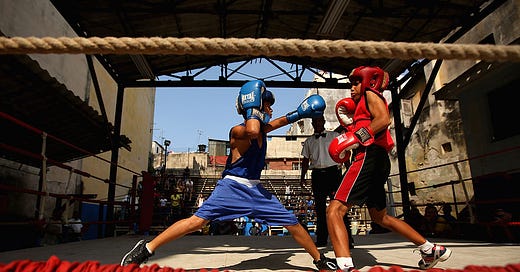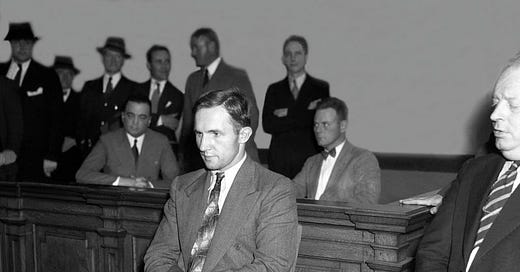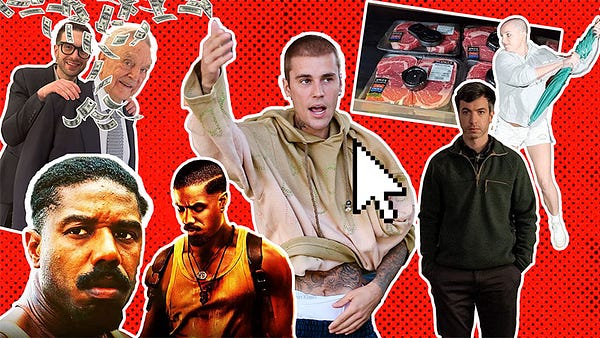
The Free Press

Earlier this week, I interviewed the entrepreneurs and venture capitalists Marc Andreessen and Peter Thiel at a conference. The conversation largely focused on the technological revolution that they have spent their careers catalyzing—and how that revolution is disrupting and destabilizing every aspect of our society.
But I opened with the question on everyone’s mind: Elon vs. Zuckerberg. What was the smart bet on the Silicon Valley cage match?
This is an impossible question for Thiel and Andreessen to answer. Thiel founded PayPal with Musk; Andreessen’s fund, a16z, invested $400 million in Twitter when Elon took over. Thiel was the first outside investor in Facebook; Andreessen remains on Meta’s board.
So they deflected, but in Andreessen’s case with an answer that was far more provocative than the question. He advanced a full-throated defense not just of the Silicon Valley brawl, but of learning to fight more generally. Here’s his argument. —BW
What do I think of Mark Zuckerberg’s recent mixed martial arts (MMA) training, Elon Musk’s challenge to a cage match between the two, and public reports of a Musk/Zuckerberg fight that may well happen later this year, perhaps in the actual Roman Colosseum? I think that’s all great. Here’s why.
First, while the extraordinary Dana White and his Ultimate Fighting Championship (UFC) have elevated MMA into a highly popular public sport over the last 20 years, it’s important to understand how important—how primal—MMA is in the story of our civilization.
MMA is the original combat sport; it was introduced to the actual Greek Olympic Games in 648 BC(!). The Greeks called it “pankration” (παγκράτιον), but it is the same thing: a combination of boxing and wrestling.
To quote Wikipedia: “In Greek mythology. . . the heroes Heracles and Theseus invented pankration as a result of using both wrestling and boxing in their confrontations with opponents. Theseus was said to have used pankration to defeat Cercyon of Eleusis in a wrestling match, as well as the minotaur in the labyrinth. Heracles. . . was depicted in ancient artworks subduing the Nemean lion using pankration.”
More: “Pankration, as practiced in historical antiquity, was an athletic event that combined techniques of both boxing and wrestling . . . although knockouts were common, most pankration competitions were decided on the basis of submission (yielding to a submission or joint lock). Pankratiasts were highly skilled grapplers and were extremely effective in applying a variety of takedowns, chokes, and joint locks.”
And: “However, pankration was more than just an event in the athletic competitions of the ancient Greek world; it was also part of the arsenal of Greek soldiers—including the famous Spartan hoplites and Alexander the Great’s Macedonian phalanx.” If the hair on the back of your neck isn’t standing up as you read this. . .
MMA isn’t just a sport. It’s the sport. And today, like then, it has not just sporting elements but real-world utility. I’ll come back to that in a minute.
I was also asked whether I consider Mark and Elon to be role models to children in their embrace of fighting, and I said, enthusiastically, yes. And I further recommended to the audience that they have their children trained in MMA, as my wife and I are. Kids as young as eight and maybe even younger are totally capable of learning both the striking and grappling dimensions of the sport. MMA teaches not just combat skills—and it does teach those—but also discipline, emotional control, respect, and a deep sense of responsibility.
The message to kids is not “this is how you beat people up.” The message is “this is how you protect yourself.” And, as important, this is how you protect your family, your friends, your community. You use these combat skills in the service of others. You never start a fight, but when someone threatens someone you love, or even an innocent bystander, this is how you end a fight.
To a lot of people, this sounds like a message out of time. Surely in the modern world, one would never need to protect oneself or one’s family with actual interpersonal physical violence?
I would love for that to be the case, but unfortunately, the world is evolving in such a way where that is becoming less true every day. Many of the biggest and most important cities in the United States have decided they don’t need law enforcement. Street level violence is on the rise, as anyone in those cities with functional eyes can see. People get attacked in the street, or in carjackings and home invasions, daily, in plain sight, and little to nothing happens. It’s terrible, but it’s true.
So, yes, if there aren’t going to be police to protect you and your loved ones from real-world violent assault, there is a practical need to know applied self-defense. And hand-to-hand fighting—MMA—is the core self-defense skill.
Another benefit of MMA training, both for children and adults, is physical fitness. We all know our culture is in the grip of an obesity crisis. According to the CDC, “Obesity in the United States now affects 100.1 million (41.9%) adults and 14.7 million (19.7%) children.” This is a terrible situation that curses people to shorter and unhappier lives.
President John F. Kennedy saw this coming in his time: “We are underexercised as a nation. . . . The remedy, in my judgment, lies in one direction; that is, in developing programs for broad participation in exercise by all of our young men and women, all of our boys and girls. . . . The sad fact is that our national sport is not playing at all, but watching. We have become more and more not a nation of athletes but a nation of spectators. . . . There are more important goals than winning contests, and that is improve on a broad level the health and vitality of all our people.”
We did not listen to him in the decades that followed, but we can now.
MMA training is likely the best path for widespread gains in physical fitness, particularly for children. MMA training itself is effective exercise, and it motivates one to improve one’s strength and endurance. And not just in the abstract, as a pointless hamster wheel process, but for a purpose: to win fights.
Finally, consider the combination of physical fitness and the ability to defend who one loves. The result is self-respect. Not the self-respect of armchair therapy and wishful thinking, but real self-respect—the earned realization that one is strong and useful and of merit and value. Skilled fighters carry themselves differently, and this is why.
In our present time, where many young people are suffering from anxiety, depression, and what can be described only as anomie—again, from the Greek, ἀνομία, “lawlessness,” a collapse in the code of expected adult behavior—what could be better than a return to earned self-respect?
One more thing: lest this be taken for some kind of gendered argument, let me say clearly that I think MMA is just as useful and relevant for young girls as it is for young boys. So, yes, I think it’s great that MMA is the rising American national sport, that Mark is training so hard in it (and getting jacked), that Elon—a past martial arts aficionado in his own right—is challenging Mark to a fight, and that both Mark and Elon are top-end role models for children in our society, including my own—whether they end up fighting in the Colosseum or not.
If it was good enough for Heracles and Theseus, it’s good enough for us. Fight!
Become a Free Press subscriber today:















Excellent points here on self defense, fitness, and confidence! As a lifelong martial artists and now coach, I am a big advocate for martial arts at any age, but especially for the youth.
One thing that is extremely important to note, however, is the risk of CTE and other brain-related injuries. An ignorant coach, poorly structured curriculum, and careless instruction all increase the chances of long-term damage.
It's about finding balance; training hard and training smart. And the last thing we need is to further give MMA a bad rap, because of its inherent brutality... which is why safety protocols must be built into every martial arts curriculum!
" ... this is how you end a fight." Maybe once upon a time. Now, it seems a gun is how you end a fight.